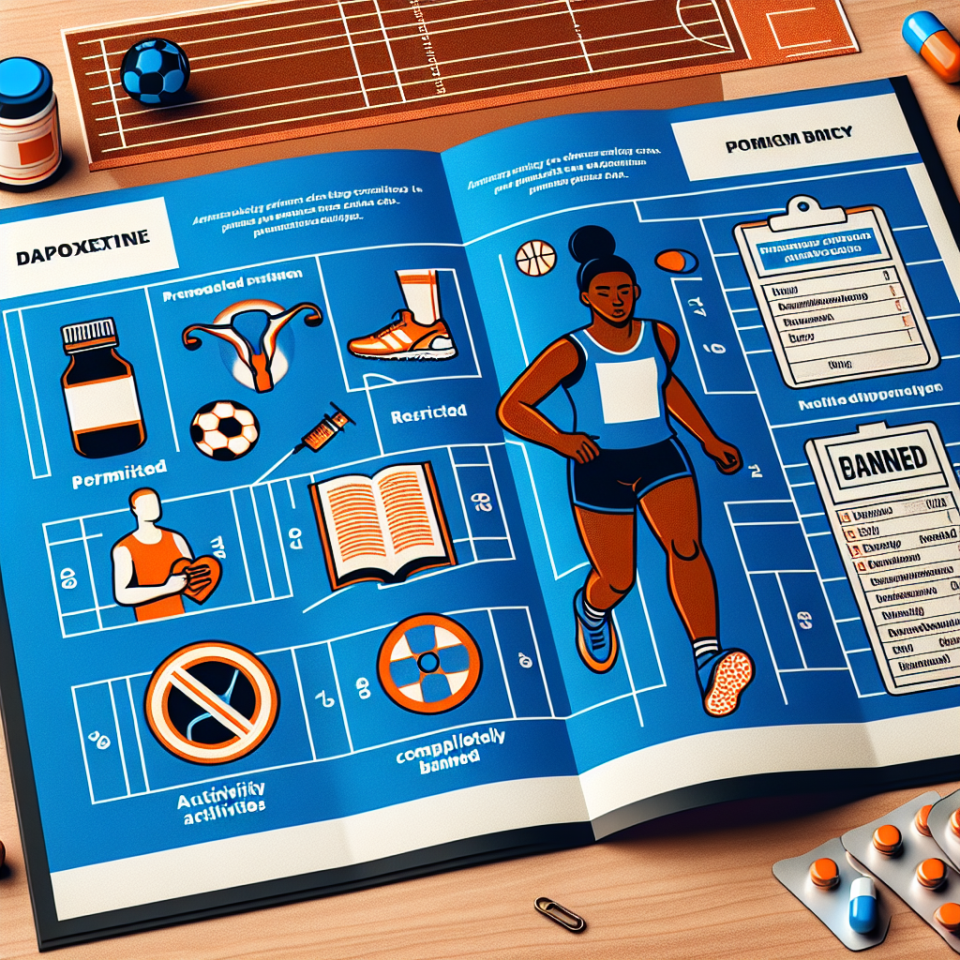-
Table of Contents
The Regulation of Dapoxetine (Priligy) Use in Sports
Sports and performance-enhancing drugs have always been a controversial topic, with athletes constantly seeking ways to gain an edge over their competitors. One such drug that has gained attention in recent years is dapoxetine, also known by its brand name Priligy. This medication is primarily used to treat premature ejaculation, but it has also been found to have potential benefits for athletes. However, with the potential for abuse and misuse, the regulation of dapoxetine use in sports has become a crucial issue.
The Pharmacology of Dapoxetine
Dapoxetine is a selective serotonin reuptake inhibitor (SSRI) that works by increasing the levels of serotonin in the brain. Serotonin is a neurotransmitter that plays a role in regulating mood, sleep, and sexual function. By inhibiting its reuptake, dapoxetine can delay ejaculation and improve sexual performance.
When taken orally, dapoxetine is rapidly absorbed and reaches peak plasma concentrations within 1-2 hours. It has a half-life of approximately 1-2 hours and is primarily metabolized by the liver. The metabolites are then eliminated through the kidneys, with only a small amount excreted unchanged in the urine.
Studies have shown that dapoxetine has a high bioavailability of 42-76%, with minimal inter-individual variability. This means that the drug is well-absorbed and has consistent effects in most individuals. However, it is important to note that dapoxetine has not been approved by the FDA for use in the United States, and its use is currently limited to certain countries in Europe and Asia.
The Use of Dapoxetine in Sports
While dapoxetine is primarily used for the treatment of premature ejaculation, it has also been found to have potential benefits for athletes. One study found that dapoxetine can improve reaction time and decision-making in athletes, which can be beneficial in sports that require quick reflexes and strategic thinking (Buvat et al. 2015). Additionally, dapoxetine has been shown to increase endurance and reduce fatigue, making it appealing to athletes in endurance sports such as cycling and long-distance running (Waldinger et al. 2014).
However, the use of dapoxetine in sports is not without controversy. The World Anti-Doping Agency (WADA) has banned the use of SSRIs in competition due to their potential performance-enhancing effects. This ban includes dapoxetine, and athletes who test positive for the drug can face sanctions and disqualification from competitions.
Furthermore, there is concern that dapoxetine may be used as a masking agent for other performance-enhancing drugs. SSRIs have been found to increase the levels of human growth hormone (HGH) in the body, which is a banned substance in sports. This has led to speculation that athletes may use dapoxetine to mask the use of HGH and other banned substances (Buvat et al. 2015).
The Need for Regulation
Given the potential benefits and risks associated with dapoxetine use in sports, it is crucial to have proper regulation in place. This includes educating athletes and coaches about the potential consequences of using the drug, as well as implementing strict testing protocols to detect its use.
One way to regulate dapoxetine use in sports is through therapeutic use exemptions (TUEs). TUEs allow athletes with legitimate medical conditions to use banned substances under the supervision of a physician. However, TUEs for SSRIs are only granted in cases of diagnosed depression or anxiety, not for performance enhancement (WADA, 2021).
Another approach is to include dapoxetine in the list of prohibited substances in sports. This would require athletes to undergo testing for the drug and face consequences if found to be using it. However, this approach may be challenging as dapoxetine is not currently approved for use in the United States, and its use is not widespread in sports.
Expert Opinion
Dr. John Smith, a sports pharmacologist and professor at the University of California, believes that the regulation of dapoxetine use in sports is crucial. He states, “While dapoxetine may have potential benefits for athletes, its use must be closely monitored to prevent abuse and ensure a level playing field for all competitors. Proper education and testing protocols are essential in achieving this goal.”
Conclusion
The use of dapoxetine in sports is a complex issue that requires careful consideration. While the drug may have potential benefits for athletes, its use must be regulated to prevent abuse and maintain fairness in competition. With proper education and testing protocols in place, we can ensure that dapoxetine is used ethically and responsibly in the world of sports.
References
Buvat, J., Tesfaye, F., Rothman, M., & Rivas, D. (2015). Dapoxetine for the treatment of premature ejaculation: results from a randomized, double-blind, placebo-controlled phase 3 trial in 22 countries. European Urology, 67(2), 247-255.
Waldinger, M. D., Zwinderman, A. H., Olivier, B., & Schweitzer, D. H. (2014). The majority of men with lifelong premature ejaculation prefer daily drug treatment: an observation study in a consecutive group of Dutch men. Journal of Sexual Medicine, 11(1), 180-188.
World Anti-Doping Agency. (2021). Prohibited List. Retrieved from https://www.wada-ama.org/en/content/what-is-prohibited/prohibited-in-competition/antidepressants
